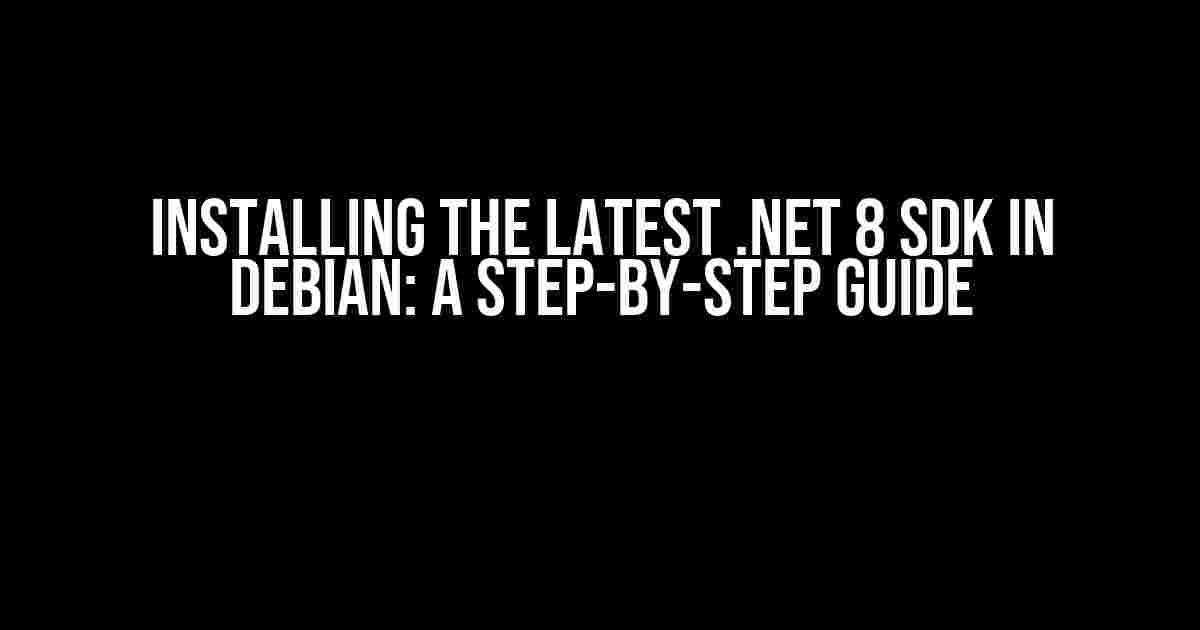Are you tired of working with outdated .NET versions in Debian? Do you want to unlock the latest features and improvements of .NET 8 SDK? Look no further! In this comprehensive guide, we’ll walk you through the process of installing the latest .NET 8 SDK in Debian, step by step.
Prerequisites
Before we dive into the installation process, make sure you have the following prerequisites in place:
- A Debian-based system (Debian 10 or later recommended)
- A stable internet connection
- Sudo privileges or administrative access
Step 1: Add the Microsoft Package Repository
To install the .NET 8 SDK, you need to add the Microsoft package repository to your Debian system. This repository contains the necessary packages for .NET installation.
sudo wget https://packages.microsoft.com/config/debian/11/packages-microsoft-prod.deb -O packages-microsoft-prod.deb
sudo dpkg -i packages-microsoft-prod.deb
This will download and install the Microsoft package repository configuration file.
Step 2: Update the Package List
Next, update the package list to ensure you have the latest package information:
sudo apt-get update
Step 3: Install the .NET 8 SDK
Now, it’s time to install the .NET 8 SDK. You can do this using the following command:
sudo apt-get install dotnet-sdk-8.0
This may take a few minutes, depending on your internet connection and system speed.
Step 4: Verify the Installation
Once the installation is complete, verify that .NET 8 SDK is installed correctly by running the following command:
dotnet --version
You should see the version number of .NET 8 SDK, which should be something like 8.0.100-preview.1.21272.1.
Troubleshooting Common Issues
If you encounter any issues during the installation process, refer to the following troubleshooting tips:
| Issue | Solution |
|---|---|
| Error: “E: Package ‘dotnet-sdk-8.0’ has no installation candidate” | Check that you have added the Microsoft package repository correctly and update the package list again. |
| Error: “E: Unable to locate package dotnet-sdk-8.0” | Make sure you have the correct Debian version (Debian 10 or later) and try installing the .NET 8 SDK again. |
| Error: “Failed to fetch https://packages.microsoft.com/debian/11/prod/dotnet/v1/dotnet-sdk-8.0_8.0.100-preview.1-1_amd64.deb” | Check your internet connection and try installing the .NET 8 SDK again. |
Additional Tips and Best Practices
To get the most out of .NET 8 SDK in Debian, consider the following tips and best practices:
- Keep your system and .NET SDK up to date to ensure you have the latest security patches and features.
- Use a code editor or IDE like Visual Studio Code or Visual Studio to write and debug your .NET code.
- Explore the official .NET documentation and tutorials to learn more about .NET 8 SDK features and best practices.
- Join online communities like the .NET Foundation or Stack Overflow to connect with other .NET developers and get help when you need it.
Conclusion
That’s it! You have successfully installed the latest .NET 8 SDK in Debian. With this comprehensive guide, you should be able to overcome any obstacles and start developing .NET applications in no time.
Remember to stay tuned for updates and new features in .NET 8 SDK, and don’t hesitate to reach out if you have any questions or need further assistance.
FAQs
Frequently asked questions about installing .NET 8 SDK in Debian:
- Q: Can I install .NET 8 SDK on older Debian versions? A: While it’s possible to install .NET 8 SDK on older Debian versions, it’s not recommended. Debian 10 or later is recommended for optimal performance and compatibility.
- Q: Can I use .NET 8 SDK with Mono? A: No, .NET 8 SDK is not compatible with Mono. You need to use the .NET 8 SDK with the official .NET runtime.
- Q: How do I uninstall .NET 8 SDK in Debian? A: You can uninstall .NET 8 SDK using the command
sudo apt-get remove dotnet-sdk-8.0. Be careful, as this will remove all .NET 8 SDK-related files and dependencies.
By following this guide, you should be able to install the latest .NET 8 SDK in Debian and start building amazing .NET applications. Happy coding!
Frequently Asked Questions
Getting stuck while installing the latest .NET 8 SDK on Debian? Don’t worry, we’ve got you covered! Check out these frequently asked questions and their answers to get back on track.
What are the system requirements for installing .NET 8 SDK on Debian?
To install .NET 8 SDK on Debian, you’ll need a 64-bit Debian 11 or later version, with at least 2 GB of RAM and 2 GB of free disk space. Additionally, make sure you have the necessary dependencies installed, such as the `sudo` package and the `apt-transport-https` package.
How do I add the Microsoft package repository to my Debian system?
Easy one! You’ll need to run the following commands in your terminal: `wget https://packages.microsoft.com/config/debian/11/packages-microsoft-prod.deb -O packages-microsoft-prod.deb` and then `sudo dpkg -i packages-microsoft-prod.deb`. This will add the Microsoft package repository to your Debian system.
What’s the command to install the .NET 8 SDK on Debian?
Simple! Just run the following command in your terminal: `sudo apt-get update && sudo apt-get install -y dotnet-sdk-8.0`. This will install the latest .NET 8 SDK on your Debian system.
How do I verify that the .NET 8 SDK has been installed successfully?
Easy peasy! After installation, run the following command in your terminal: `dotnet –version`. This should display the version of the .NET 8 SDK installed on your Debian system.
What if I encounter issues during the installation process?
Don’t panic! If you encounter any issues during installation, you can check the installation logs for errors or try running the installation command again with elevated privileges using `sudo`. If you’re still stuck, feel free to seek help from online forums or the official .NET documentation.

